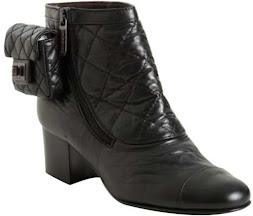Bracelet (pronounced breys-lit)
(1) An
ornamental band or circlet for the wrist or arm or, sometimes, for the ankle.
(2) Slang
in the criminal classes for a pair of handcuffs (almost always in the plural).
(3) In furniture
design, types of collars.
(4) An expanding
metal band for a wristwatch (usually used only as technical term within the
industry).
(5) In
law enforcement in some jurisdictions, as ankle bracelet (or tag), a device to
monitor location or provide 24/7 real-time testing of drug or alcohol
consumption (eg the SCRAM Bracelet (Secure Continuous Remote Alcohol Monitor)).
(6) In
the field of combinatorics, a cyclical sequence of symbols used in
combinatorial mathematics.
(7) An
identification tag used by medical institutions to contain allergy, clinical or
identity data or for religious or cultural purposes.
(8) In
the history of armory, a type of personal body armor worn on the upper arm.
1400–1450: From the late Middle English from the Middle French, from the Old French bracel (literally “a little arm”), diminutive of bracelet, from the Latin bracchium (an arm; a forearm); the Latin brāchiāle (armlet) was a noun use of the neuter of brāchiālis + -et (from the Middle English & Old French -et, the suffix used to form diminutives, loosely construed, from the Late Latin –ittus). Latin gained the word from the Ancient Greek brakhion (an arm) whereas the usual Latin word for an armlet (metal band or ring worn around the upper arm) was armilla which, in Late Latin, (1530s) meant also "a small intrusion of the sea into the land". The migration from wrist to ankle as anklet (ornamental ring for an ankle) dates from 1810. Synonyms include ornament, trinket, bangle, manacle, circlet, wristlet & armlet; the related adjective is armillary. Bangle (an ornamental ring worn upon the arm or ankle), dating from 1787, was absorbed by English under the Raj, borrowed from the Hindi bangri (colored glass bracelet or anklet). Bracelets and bangles are both worn predominately on the wrist, the difference being a bracelet is of free-form design, made often from links or other connecting components not molded to a particular shape. Bangles tend to be ring-shaped (although need not be perfectly circular) and made from solid materials.
Electronic Surveillance Bracelets
The ubiquity in urban spaces of the global positioning system (GPS) has made possible electronic tagging, a form of surveillance using a device affixed to a person, secured most often around the ankle. Curiously, both the industry and the agencies of law enforcement involved refer to them most often as monitoring or surveillance bracelets, even though the jewelry business from which bracelet is borrowed, uses the word to refer to things worn on the wrist, adornments around the ankle known as anklets. Indeed, so specific are jewelers that they categorize their products with a range of self-explanatory coordinate terms derived from bracelet: armlet, kneelet, leglet and anklet. To this they also add the seemingly superfluous necklet & wristlet but these are used to distinguish the loose-hanging necklace and bracelet from creations more close-fitting. There appears to be no fingerlet or toelet, presumably because of the anatomical constraints in designing anything loose as companion products to rings and toe-rings, nipplelets a similarly improbable challenge of engineering. Anklet is used also in some markets to describe a very short sock.
There appears no reason why surveillance devices attached around the ankle tend to be called bracelets other than the imitative inertia of use based on the early products being so-labelled. That was despite anklet hardly being a novel form, having existed since 1810 and more venerable still was "bangle", dating from 1787 as a borrowing under the Raj of the Hindi bangri where it described a colored glass bracelet worn either on the wrist of ankle. The original patents appear to have referenced “bracelet” so this may have influenced the pattern of use. The phrase surveillance anklet certainly exists and is used commercially but is rare by comparison.
Lindsay Lohan in SCRAM bracelet (left), the SCRAM (centre) and Chanel's response from their Spring 2007 collection (right).
A very twenty-first century bracelet: Before Lindsay Lohan began her “descent into respectability” (a quote from the equally admirable Mandy Rice-Davies (1944-2004) of MRDA fame), Lindsay Lohan inadvertently became of the internet’s early influencers when she for a time wore a court-ordered ankle monitor (often called “bracelets” which etymologically is dubious but rarely has English been noted for its purity). At the time, many subject to such orders often concealed them under clothing but Ms Lohan made her SCRAM (Secure Continuous Remote Alcohol Monitor) a fashion statement, something that compelled the paparazzi to adjust their focal length to ensure her ankle of interest appeared in shots. The industry responded with its usual alacrity and “ankle monitor” purses were soon being strutted down the catwalks.
Chanel's boot-mounted ankle purse in matching quilted black leather.
In one of several examples of this instance of Lohanic influence on design, in their Spring 2007 collection, Chanel included a range of ankle bags. Functional to the extent of affording the wearing a hands-free experience and storage for perhaps a lipstick and credit card (seldom should the modern young spinster need more), the range was said quickly to "sell-out" although the concept hasn't been seen in subsequent collections so analysts of such things should make of that what they will. Chanel offered the same idea in a boot, a design actually borrowed from the military although they tended to be more commodious and, being often used by aircrew, easily accessible while in a seated position, the sealable flap on the outer calf, close to the knee.
The chunky silver chain bracelet worn by Lindsay Lohan in The Canyons (2013) was the Boucle Sellier from Hermes Spring/Summer 2010 collection, the stylish double-prong buckle an exemplar of over-engineering.

















